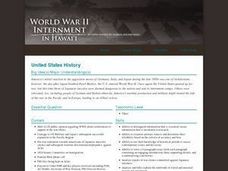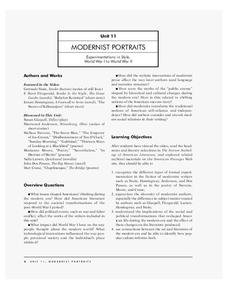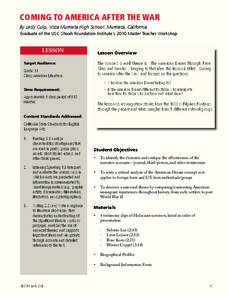Curated OER
The First World War
Students examine the process and effects of World War I on different segments of the population, beyond the political, diplomatic and military framework of the war. They analyze the memoirs of soldiers, read poetry of the time, and...
National History Day
More Than Mud and Cooties: The Poetry of World War I Soldiers
Poetry is not just for romance. Teach middle schoolers about soldiers' experiences during World War I with poetry written by the soldiers themselves. The instructional activity includes a simulation activity, a graphic organizer...
National Endowment for the Humanities
Chronicling America: Uncovering a World at War
As part of a study of World War I, class members read newspaper articles from the time that urge American involvement, non-involvement, or neutrality. Using the provided worksheet, groups analyze the articles noting the central argument...
Carolina K-12
Trench Warfare in World War I
Class members engage in an experiential activity and research topics related to the exercise to gain a deeper understanding of the conditions in the trenches during World War I. A potent and thought-provoking activity.
Poetry Society
War Horse and WWI Poetry
Here's a resource that deserves a place in your curriculum library. As part of their study of War Horse individuals create an anthology of World War I poetry.
National History Day
Poetry from the Trenches of World War I
Often, the real-life experiences of soldiers gets lost back home when the war seems so far away. Scholars investigate the personal side of World War I in the trenches of Europe to complete a collaborative social studies activity. When...
Roy Rosenzweig Center for History and New Media
War and Poetry
A band of brothers or the Devil's agents? Nobel warriors freeing the oppressed or mercenaries working for the military/industrial complex? Groups examine poems from the Civil War, World War I, and World War II to determine the poets'...
Carolina K-12
The End of World War II: Pearl Harbor, Japanese Internment Camps, and the Atomic Bomb
The end of World War II saw major events that would forever change the global landscape and international relations. Using a fantastic PowerPoint presentation and several primary source documents, your learners will discuss the...
Curated OER
My Secret War: Lesson 5
Fifth graders determine how freedom comes with rights and responsibilities through literature and poetry about World War II. In this World War II lesson plan, 5th graders use the letters in the word "infamy" to write an acrostic poem....
Curated OER
World War II: Internment in Hawaii
Students examine world history by writing an essay in class. In this World War II lesson, students identify the attack on Pearl Harbor, the response from the U.S and the effect it had on Japanese-Americans. Students define Japanese...
Curated OER
Poetry of War and Peace
Students read and discuss the poem "In Flanders Fields," then write poems evoking images of peacetime. They practice the techniques of writing poetry while using textual imagery to create visual images.
Curated OER
Poetry of The Great War: 'From Darkness to Light'?
Students examine World War I poetry for historical context, poetic devices, and participate in a class discussion. They write an analysis of the poetry's form and its content.
Teaching English
In Flanders Fields
War is one of the most profound human experiences in history, and is often best depicted in works of art and literature. Introduce class members to the poetry of World War I with this resource that uses John McCrae's "In Flanders Fields"...
Royal Canadian Legion
Teachers' Guide: Take Time to Remember
The Royal Canadian Legion offers this teacher's guide designed to remind learners of all ages of the sacrifices made by Canadian soldiers in not only World War I but also the Korean and Gulf wars. The 42-page packet is filled with...
K20 LEARN
Comparing/Contrasting Characters Through Two-Voice Poems: Characterization
Two babies, two fathers, two experiences, two worlds. Partners craft two-voice poems to capture the points of view of two men with very different lives who have just become fathers.
Curated OER
Unknown Frost Poem Discovered
What? A long-lost poem from Robert Frost? Introduce your class to a poem recently found and published from Robert Frost's personal collection. The lesson includes background information on the author, the poem itself, and a list of...
Facing History and Ourselves
A Scene from a Middle School Classroom
Citizens in the modern world can't imagine making the same social choices made by many Germans in the 1920s and 1930s, but they don't realize that they actually do it every day by ostracizing others. A case study of middle schoolers...
Curated OER
World War I For the Soldier
Ninth graders examine the main events of World War I and identify the major points of the Treaty of Versailles. They read and discuss a scenario about boys fighting at school and create a treaty, read the poem "The Sentry" by Wilfred...
Annenberg Foundation
Rhythms in Poetry
Rhyme, rhythm, free verse, imagery: Do these words describe poetry, or jazz music? The answer is both! A resource explores these similarities as scholars watch a video, engage in discussion, read author biographies, write poetry and...
Curated OER
Survivor Stories
Trace a survivor's story using a timeline, map skills, poetry and/or prose and photography, and make a visual representation of a survivor's journey through his or her life as a culminating activity for the class and the survivor....
Curated OER
Using Primary Sources to Study the Holocaust
Engage your middle schoolers with Pastor Martin Niemoller's famous poem that begins, "First they came for the communists." Now that you have their attention, send learners to the various work stations you created to have them explore...
Curated OER
Dulce et Decorum est by Wilfred Owen
It is entirely fitting and proper that Wilfred Owen’s powerful “Dulce et Decorum Est” is the poem used for an exercise in close reading, discussion, analysis, and argumentative writing. Class members discuss focus questions in pairs,...
Annenberg Foundation
Modernist Portraits
How did literature reflect people's attitudes in post-World War I America? A lesson explores the topic using a variety of activities. Individuals watch and respond to a video; read author biographies and engage in discussion; write...
University of Southern California
Coming to America After the War
As part of their exploration of the American dream, class members examine primary source materials to compare immigrant experiences of those arriving early in our country's history to those arriving in the US after World War...

























